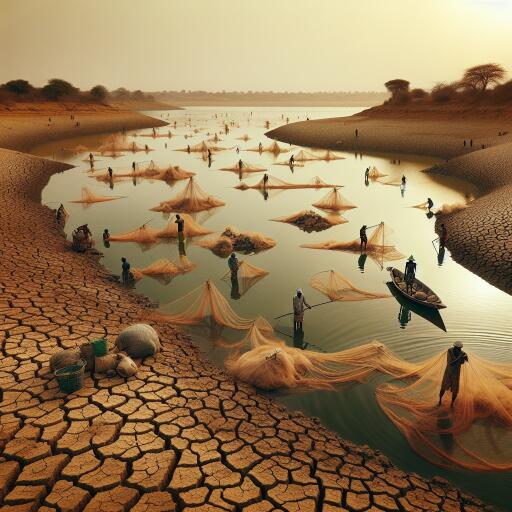
A pond in warming Mali is disappearing, and UNESCO-listed fishing tradition is in danger
In the vibrant heart of southern Mali, the small town of San braces for its most cherished event, Sanke mon. This annual collective fishing festivity, a tradition deeply rooted in the local culture for centuries, is a spectacular ceremony that intertwines animal sacrifices and offerings to the spirits of the Sanke pond with the vibrant energy of masked dancers and traditional garb. Recognized by UNESCO for its significant cultural value, this event not only signifies the onset of the rainy season but also commemorates the founding of the town itself.
However, beneath the surface of this colorful celebration, a pressing threat looms. Climate change, with its sweeping heatwaves across Mali, is relentlessly chipping away at the existence of the Sanke pond. Mamadou Lamine Traore, a respected village chief, voices his growing concern as he witnesses the gradual drying of this critical water body. Mali has been grappling with skyrocketing temperatures, reaching a staggering 48.5 degrees Celsius (119 degrees Fahrenheit) recorded by Emmanuel Doumbia, a diligent local weather observer. This year’s heatwaves have not only exacerbated the pond’s vulnerability but have also contributed to a significant surge in heat-related fatalities across the nation, particularly alarming during the holy month of Ramadan.
An alarming analysis by the World Weather Attribution points to a dire reality where climate change has escalated maximum temperatures in Mali and Burkina Faso by 1.5 degrees Celsius (2.7 degrees Fahrenheit), a stark signal that the Sahel region, already prone to harsh droughts, faces even more daunting climatic challenges ahead.
The repercussions of these climatic adversities are vivid during the latest Sanke mon event. Participants, drenched in sweat under the scorching sun, demonstrated resilience as they maintained the tradition, preparing meals over reeds and adjusting traditional attire amidst the oppressive heat. Amadou Coulibaly, a loyal participant, reflects on the profound connection to this cultural heritage, undeterred by the encroaching threats.
Despite the urgent need for intervention highlighted when the rite earned its place on the UNESCO heritage list in 2009, promises of revitalizing the pond through excavation to prevent silting have stagnated. The inaction looms large over San, as the drying pond threatens not only the ancient rite but the socio-economic fabric of the community.
As the town of San confronts the looming demise of its cherished Sanke pond, the struggle transcends the loss of a cultural spectacle. It symbolizes a larger battle against climate change’s relentless march, threatening not just a traditional fishing rite but the very survival of an ancient way of life. The fight to save Sanke pond is more than an endeavor to preserve a cultural heritage; it is a vivid reminder of the urgent need for global action against the environmental crises that endanger communities worldwide.





Leave a Reply